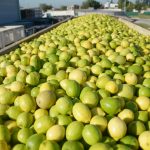Argentina's fruit industry outlines supply chain challenges amid pandemic

As fruit producers and suppliers face challenges across Latin America, Argentina's apple and pear exports confront difficulties amid the Covid-19 pandemic.
Marcelo Loyarte of Argentina's Integrated Fruit Industry Organization (CAFI) told FreshFruitPortal.com that as Argentina declared Covid-19 a national emergency, the fruit sector was named an essential service and continues working throughout the crisis.
After the total quarantine measures were enforced in the country, CAFI immediately identified potential risks and challenges so that the industry could anticipate difficulties before they happened.
Loyarte explained that the focus of CAFI's efforts is securing smooth processes throughout the entire supply chain. From harvest to packing to transportation, the sector constantly has in mind "from the very beginning, the health of people" amid the virus crisis as a priority.
However, the health crisis has created big challenges for the industry's supply chain and transportation. In the first moments of the national lockdown, CAFI sought to find information about how it would be able to dispatch trucks, for example, relative to government procedures.
"We had to recognize the role of the government authorities in order to resolve our own challenges when planning how we were going to move forward," explained Loyarte.
Addressing the crucial role of the fruit industry
This, he added, was central to how the industry addressed potential situations in the first few days of the Covid-19 restrictions put out by the Argentine government.
"Sustaining harvest, packing and logistical processes have been a big challenge and in order to continue operating, we had to overcome a series of inconveniences in the first few days (like securing fluid transportation, provisional packing materials, etc.)," he explained.
There have been shifts in the supply chain measures - especially regarding packing materials - as the country is ever more concerned with making sure that the contagious virus isn't spread throughout the chain.
Argentina's packaging challenges
The industry had to assure that critical packing materials were available during this time of crisis. So, industries that provide packaging, wooden crates, etc. all needed to be considered "critical" sectors for the government.
"To achieve this, to make sure that these sectors were included as critical industries, was an entirely different challenge," he said.
As Loyarte detailed, everyone in the industry is working to take the necessary precautions in the labor involved in the sector.
Of those involved, "employees in transportation companies, within state organisms themselves, custom and border officials, transport companies generally and local and provincial governments," are all facing challenges, according to Loyarte.
"What we have done thus far is maintain clear communication between the national government and the fruit sector to ensure that we continue receiving information about potential inconveniences, how to resolve them and which challenges we have yet to solve," detailed Loyarte.
He went on to speak to the specific sanitary conditions that Covid-19 requires in Argentina. Apart from the abiding by the official recommendations of the World Health Organization, Argentina's fruit industry is committed to securing clean conditions from harvest to packing.
Commitment to supplying fruit to the consumer
This, according to CAFI, is part of the fruit sector's responsibility to consumers.
Speaking to this, Loyarte said, "Fruits are an essential part of a healthy diet and, as people are in their houses without much activity, confronting potential negative impacts of a sedentary lifestyle is crucial. Fruits, produce and hydration - among other things - are important, according to specialists."
For CAFI, the role of Argentina's fruit industry in this time of crisis is to provide people access to apples and pears in the context of this new reality.
"We are beginning to be recognized in society for playing this part. In the few times that people are able to go out to vegetable stands and supermarkets to get fresh fruit, they're going to look for fruits that we provide. And making sure that those fruits are there, that's our challenge," he explained.
Speaking to possible developments, Loyarte emphasized that "the current circumstances have really shown the importance of the fruit industry in providing fundamental nourishment for people". And this is the reason that the organization continues working to ensure that people get what they need, he said.















































